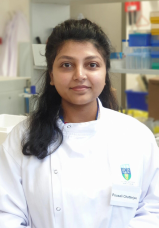Barrett’s Oesophagus to Oesophageal cancer: cellular metabolic pathway manipulation and the role of HDL proteome as immune-metabolic biomarker of disease progression.
 Pousali Chatterjee
Pousali Chatterjee
Pousali is the second PhD student appointed by the All-Ireland Cancer Research Network (AllCaN) Programme. Pousali is working under the supervision of Dr. Fiona McGillicuddy and Prof. Helen Roche at UCD to answer the research question: can we improve the identification of survivors who most need dietary support using personalised biomarkers, and is it visceral adiposity or dietary saturated fatty acids that augment the risk of transition from Barrett’s Oesophagus (BO) to oesophageal cancer (OAC)?
Inflammation plays an important role in driving a transition from a pre-cancerous state (Barrett’s Oesophagus) to a malignant oesophageal cancer (OAC) state. Pousali aims to explore the effects of the fuel sources available to the cells on the subsequent mounting of cellular inflammation and growth rate. The fuel sources available to the cells (sugar or fat) will dictate the type of metabolism the cells undergo (glycolysis = breaking down glucose or fatty acid oxidation = burning of fat). Thus, we will control cellular metabolism by regulating the fuels delivered to the cells. This will give greater insights into how dietary composition may contribute to disease transitioning in humans. In parallel, we will measure the proteins attached to ‘good cholesterol’ (HDL) particles as a new biomarker of inflammation in humans at risk of OAC, and the degree to which exercise intervention in high-risk individuals can reduce inflammation.
Back
Start year
2024
End year
2028
Principal Investigators
Dr. Fiona McGillicuddy and Prof. Helen Roche
Researcher
Pousali Chatterjee
Institution
University College Dublin
Grant Funding
All-Ireland Cancer Research Network (AllCaN) Programme
Linked Breakthrough Research Priorities
Increase research investment into poor prognosis cancers and currently incurable cancers prioritising lung, oesophageal, ovarian, pancreatic, brain, liver and stomach cancers.
Fund research which aims to improve the effectiveness or specificity of current cancer therapies including investing in biomarkers discovery, nutrition and therapeutic delivery.









 Contact
Contact